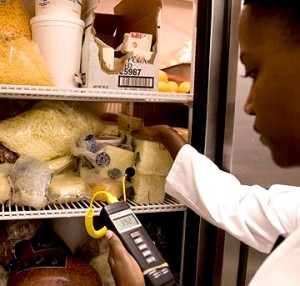Environmental Health – Food Service Facilities
Food Protection
The Health Department offers many services to help owners and operators of food facilities to follow state regulations and ensure that the food they serve is safe. About 48 million people in the U.S. (1 in 6) get sick, 128,000 are hospitalized, and 3,000 die each year from foodborne diseases (CDC). Federal and state laws for food preparation, storage, and serving help reduce the risk of getting sick from food.
Learn more about our services:

- Licenses for Commercial Food Facilities
- Routine Inspections of Food Facilities
- Temporary Food Permits
- Farmers Markets
- Excluded Food Service Facilities
- Following up on Complaints
- Offering Food Service Training
Licenses for Commercial Food Facilities
The Carroll County Bureau of Environmental Health issues over 700 food service licenses each year. This includes restaurants, grocery stores, seasonal operations, and schools. Each food service facility is given a priority rating of high, moderate, or low, depending on the types of foods served.
- HIGH: A high priority facility serves potentially hazardous foods prepared a day or more before being served. These facilities may also use food preparation methods that require the food to pass through the temperature range of 41°F to 135°F two or more times before service, such as cooking, cooling, and reheating. The high priority category includes health care facilities.
- MODERATE: A moderate priority facility serves potentially hazardous foods prepared using methods that require the food to pass through the temperature range of 41°F to 135°F only once before being served, such as cooking, hot holding, and serving. A moderate priority facility may also cut, assemble, or package on the premises.
- LOW: A low priority facility serves commercially packaged, potentially hazardous foods; non-potentially hazardous foods that are cut, assembled, or packaged on the premises (such as candy, popcorn, or baked goods); and/or hand-dipped ice cream.
Annual fees* for the licenses are:
- High Priority Facility – $275.00
- Moderate Priority Facility – $200.00
- Low Priority Facility – $75.00
- Temporary Facility** – $25/permit
*Food Service license renewals are due by December 31st each year for high, moderate, and low priority facilities.
Routine Inspections
We conduct two types of routine inspections. They are:
COMPREHENSIVE: The overall cleanliness and sanitation of the facility are evaluated, including food handling practices, water supply, and wastewater disposal. A hazard analysis critical control point (HACCP) inspection compromises a portion of this inspection. The purpose of the HACCP is to ensure that the food is handled, cooked, cooled, reheated and held at the proper temperatures and for the appropriate amount of time.
MONITORING: Equipment and food handling practices are evaluated during this inspection, along with the water supply and sewage disposal system.
The facilities priority rating determines the minimum number of inspections conducted per year:
HIGH: Three inspections per year (1 Comprehensive and 2 Monitoring)
MODERATE: Two inspections per year (1 Comprehensive and 1 Monitoring)
LOW: One Comprehensive inspection per year
Inspections cover two categories of problems: Critical Items and Good Retail Practices.
Critical Items are violations that must be corrected immediately. Some examples include:
- Food being improperly cooled
- Ready-to-serve food being cross-contaminated
- A food worker being ill
- Improper hand washing
- Inadequate cooking
- Inadequate reheating
- Food not being held at proper temperatures either hot held or cold held
- Food from an unapproved source
- Spoiled or adulterated food
- No available safe and adequate hot and cold running water
- Sewage disposal system not working properly
| Proper Temperatures: | |
| Shell eggs, fish, meat, whole roasts | 145°F |
| Shell eggs not for immediate service, ratites, comminuted fish and meats | 155°F |
| Poultry, stuffed meats, game animals | 165° F |
| Ready to eat commercially processed foods, vegetables | 135°F |
| Reheated foods | 165°F |
| Hot holding foods | 135°F or above |
| Cold holding foods | 41°F or less |
Sanitation Items are violations that must be corrected within 30 days or otherwise specified by the governing authority. Some examples include:
- Thermometers not provided or inaccurate
- Food not labeled or dated
- Food not properly protected or stored
- Poor worker hygiene; hands not properly washed or workers not using gloves
- Improper storage of toxic materials
- Insects/rodents/birds/animals not controlled
- Unsuitable equipment or utensils
- Poor disposal of trash or garbage
- Plumbing problems
- Building construction and sanitation problems
A facility may have their license suspended if the sanitation violations are not corrected within that time frame.
Temporary Food License
A temporary food service facility operates at a fixed location no more than 30 consecutive days. Temporary food facilities are usually in conjunction with fairs, carnivals, fundraising events, or similar gatherings. They are considered “special food service facilities” because the Department provides exceptions to certain regulations because of the design of the facility, food preparation methods, and/or the limited length of time that a facility operates in association with a special event.
Steps to follow to obtain a temporary food license:
- The event coordinator of the special event must apply for the temporary food license application.
- If the event has multiple food vendors, each vendor must fill out a Special Food Service application.
- The event coordinator is responsible for gathering all the appropriate forms and submitting them to the Health Department at least 14 business days prior to the event.
- Submit the appropriate forms as one packet along with applicable fees, in duplicate to the Health Department (Each application is $25)
During a temporary food event, each vendor must supply an adequate hand-washing station, ware-washing station, ground cover and overhead protection (see guidelines for special food service facility temporary license below). Furthermore, food must be stored and made on site, the day of the event.
Excluded Organizations such as a volunteer fire company or bona fide nonprofit fraternal, civic, war veterans’, religious, or charitable organization would complete the forms below and send via email to: carrollcounty.environmental@maryland.gov.
Farmers Markets
A farmers market means a place where a person offers or sells one or more of the following products directly to the public:
- Raw agricultural products
- Products processed in a private home kitchen (non-potentially hazardous fruit jams and jellies, non potentially hazardous baked goods and/or candies, and food manufactured on a farm by a licensed food processor)
- Eggs
In order to sell and sample your farm products at a farmers market, you must apply for a special food service facility temporary license. This will allow you to sample your product at a specified market for no more than 30 days a year. (refer to the temporary food license section for the appropriate forms)
Cottage Foods
According to the Code of Maryland Regulations (COMAR) 10.15.03, a cottage food product is defined as a non-potentially hazardous food as specified in COMAR 10.15.03.27. These products may be sold at a farmer’s market, public event, direct sales, personal delivery, and mail delivery. Products must be pre-packaged and adhere to specific labeling requirements.
A cottage food business must: a) produce or package cottage foods in a residential kitchen; and b) have annual revenues from the sale of cottage food products in the amount not exceeding $50,000.
A cottage food business may also sell to a retail store including a grocery store or food cooperative with the appropriate approvals from the Maryland Department of Health, Office of Food Protection. For more information regarding retail sales of cottage foods please see: https://health.maryland.gov/phpa/OEHFP/OFPCHS/Pages/CottageFoods.aspx
Mobile Food Units
According to COMAR 10.15.03.02, a “mobile food service facility” means a food service facility that is mechanically, electrically, manually, or otherwise propelled vehicle operating on land or water that moves as part of its routine operation. Mobile units are required to move from their operating location daily. Prior to purchasing a mobile unit, a plan review must be conducted by this Office. Click on the link below for procedures for obtaining a mobile unit license.
If you have a mobile unit license in another Maryland County, you may apply for a Mobile Food Unit Reciprocity License. This license allows you to operate within 90 miles of your Base of Operations without having to get additional inspections.
Maryland Mobile Food Establishment Plan Review Application
Mobile Unit Guidelines and Checklist for Plan Review
Maryland Mobile Food Establishment Reciprocity License
Excluded Food Service Facilities
Excluded Organizations are nonprofit organizations such as a volunteer fire company or bona fide nonprofit fraternal, civic, war veterans’, religious, or charitable organization that do not serve to the public more than four days per week are excluded from the permit requirements.
Opening or Remodeling a Food Service Facility
If a food service facility wants to open or remodel, the following steps are necessary:
- Call this Office and speak to an inspector in the Food Program.
- Request a copy of the plan review checklist.
- Submit the appropriate plans and paperwork (license application, workers compensation form, HACCP form)
- Apply for a County building permit, if necessary. We cannot approve the building permit until all the plans have been approved.
- Contact the inspector for a final inspection.
- You may call the inspector at any time during this process if you have any questions or concerns.
If you are thinking about purchasing a mobile food unit, please contact this office immediately. Mobile units must meet the design standards set forth for restaurants.
Plan Review Submittal Requirements
Complaints
Another service offered by this Department is the investigation of food service facility complaints. When we receive notification of a problem, the inspector will investigate the complaint within five business days. If you leave your name, we can contact you with the results of the investigation. All names are kept confidential and no personal information is given to the food facility during the investigation.
Some complaints assert that someone got sick from eating at a particular food facility. These types of complaints must be investigated within 24-48 hours of receiving the complaint. If you think you have a food borne illness, you should:
- Refrigerate leftover food immediately.
- Contact this office immediately so that we can make a site visit and if needed, take food samples.
- Make notes about what you remember about the meal. Be very specific about when the suspect food was eaten and what time your symptoms started. If you know what other people ate and when they became ill, that information is helpful during the investigation. The more information you provide to us, the better we can pinpoint a certain food or how it was prepared as the cause.
- Be willing, if need be, to submit stool samples to determine the cause of illness.
- Contact your physician should you have any medical concerns.
Training
Training is available upon request for all food service facilities or to the general public. We can tailor this training to the group requesting it. Training may include proper food handling, proper hand washing, calibration of thermometers, and HACCP. To request training, please fill out this form.
For food protection videos and other training tools, visit FDA’s Retail Food Protection page and Educational Videos page.
Other Resources:
- Food Allergies Awareness Poster (English)
- Food Allergies Awareness Poster (Spanish)
- COMAR 10.15.03 Food Service Facilities
Contact:
If you have any questions or concerns, please call 410-876-1884.
